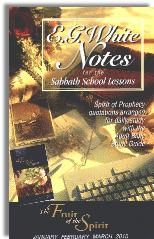|
||||||||||||||
Commentary on "The Fruit of the Spirit is Kindness"
Day 2: Sunday, January 31, 2010
Overview
In Sunday’s lesson, the author presents Jesus’ calling to perfection found in the Sermon on the Mount which is manifested in doing more than pagan and unbelievers can do: loving people that are unloving, who don’t give us back the same kindness we share with them. The reason He presents for a person’s behaving this way is our Father’s example of doing good to his friends and enemies alike, making His sun to shine on both the just and the unjust.
Observations
In the last paragraph, though, the author seems to miss Jesus’ point in demanding perfection. Jesus was establishing a standard of righteousness beyond the reach of any person. He was showing what God requires from us in order for us to understand that we are failing short of His standards. We desperately need the liberating truth of the gospel. In the light of God’s perfection, our best deeds are like a filthy garment (Isaiah 64:6). The gospel is the good news that because of Jesus’ life, death, and resurrection, we are cleansed of all our sins, past, present and future and are perfect now and forever (Heb. 10:14; Rom. 8:1).
Instead of providing us with the truth of the gospel, the author puts his readers on a guilt trip, borrowing language typical of a “perfectionism mentality”. He says: “ Try to imagine what our church would be like and what our homes would be like were we to die to self enough so that we actually could live this way!”. Implicit in this affirmation is the assertion that by dying enough to self (whatever this means is undefined and nebulous) people can reach perfection. Indirectly the message is that the people who are reading the message should feel that they should do more; they should strive more to die to self because their efforts have not been “enough”.
Today’s lesson ends with a question and an answer: “What's the only thing stopping us? Nothing but our sinful, vengeful hearts, which, more often than not, cause us to act like "publicans."” What is left unsaid in all of this is a clear presentation of the reality that the Christian life is and will always reflect the frustration of being imperfect because of indwelling sin. The supplementary question at the end, “What painful and deep changes must you make if you are going to follow Christ’s words in these verses?” makes manifest the assumption that people are able to do what Christ requires, to be perfect, and only their unwillingness to make “painful and deep changes” keeps them back from reaching their goal. The question is: if the ultimate responsibility is left with us to make these changes, how is this work supposed to be the Holy Spirit’s work? Is it not rather a program of self-help—personal transformation which has more in common with moralistic therapy than with the supernatural and mysterious work of the Holy Spirit (John 3:8)?
Summary
- Jesus set an “impossible” standard of righteousness so we would know God expected perfection of us that we are unable to attain.
- This perfection is only possible when we submit to Jesus’ death and resurrection on our behalf and accept His righteousness which is alien to us and imputed to us.
- We will always struggle with sin because we are born with intrinsic sin. Jesus credits us with righteousness even though our bodies are still dead in sin.
- There is no change we can make which will make us truly kind. The only thing we can do is to submit to the Lord Jesus and allow Him to transform us by His own power.
GO TO DAY 3
Copyright 2010 BibleStudiesForAdventists.com. All rights reserved. Revised January 27, 2010. This website is published by Life Assurance Ministries, Glendale, Arizona, USA, the publisher of Proclamation! Magazine. Contact email: BibleStudiesForAdventists@gmail.com.
The Sabbath School Bible Study Guide and the corresponding E.G. White Notes are published by Pacific Press Publishing Association, which is owned and operated by the Seventh-day Adventist church. The current quarter's editions are pictured above.
Official Adventist Resources
Standard Edition Study Guide Week 6
Teacher's Edition Study Guide Week 6
Easy Reading Edition Study Guide Week 6
Search the Complete Published Ellen G. White Writings


